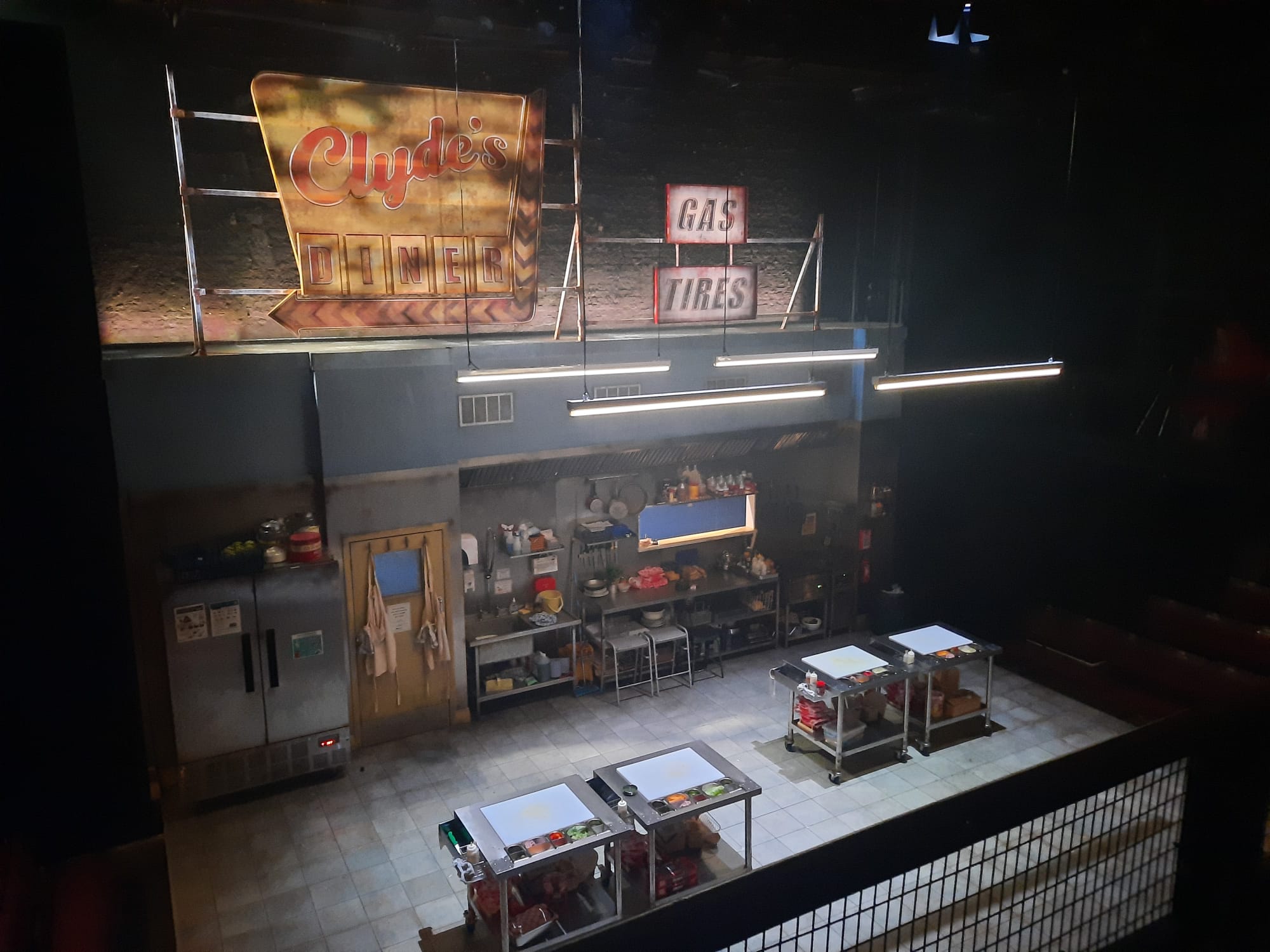Clyde’s – Donmar Warehouse, London
Lynn Nottage’s play Clyde’s picks up where Sweat, also staged at the Donmar Warehouse in 2018, left off. Life in the margins of society, but with a sense of hope, hard-earned pride and camaraderie nonetheless.

Clyde’s
It’s not even remotely possible to see every play in London, but sometimes I wish I could go back in time and see something I missed. That is the case with Sweat, a 2015 play staged at the Donmar Warehouse in 2018. By Lynn Nottage, it is a sort-of prequel to today’s subject of discussion, Clyde’s. Both take place in Reading, Pennsylvania, an economically depressed Rust Belt town. Sweat dealt with personal and racial tensions against a backdrop of industrial dispute, lockouts and picket lines. Clyde’s strikes a more hopeful note, as the staff of a truck stop diner find their purpose and route back into society after prison. The plays are in dialogue more than prequel/sequel, a pair of bookends exploring the margins of contemporary America.
Nottage conducted considerable research in Reading in the 2010s, taking time to understand local people’s lives and choices. Sadly I can’t talk much about Sweat as I missed it… But in the case of Clyde’s, the end result is an endearing, energetic and ultimately hopeful piece of theatre.
The eponymous Clyde (Gbemisola Ikumelo) is the owner of the sandwich shop. She’s outspoken and unforgiving: she knows her employees have nowhere else to go, and takes advantage of it. She has experience of the prison system herself, and has business dealings with some shady characters. Perhaps not the easiest of environments in which to plot a route back into society. Making up the rest of the cast and doing just that are her four employees Montrellous (Giles Terera), Letitia (Ronkẹ Adékoluẹjo), Jason (Patrick Gibson) and Rafael (Sebastian Orozco). Lynette Linton, also Artistic Director at the Bush Theatre, directs. We last saw the trio of Linton, Terera and Adékoluẹjo in Blues for an Alabama Sky at the National Theatre.
Healing Through Sandwiches. No, Really.
Clyde’s, which at one hour forty minutes is pushing the boundaries of how long you can go with no interval, is a lively play. The set (by Frankie Bradshaw) is to all intents and purposes a working kitchen. It has a fridge, grill, sink and four work stations. Clyde’s employees send sandwiches out from here to the waiting (unseen) customers: I can’t imagine how much rehearsal it must have taken to be making all that food while delivering lines. We learn at the outset that Montrellous acts as the leader of this little group, doling out wisdom and encouraging the others to take pride in their work. Their regular ritual involves imagining the ideal sandwich, and occasionally tasting a contender. In this way they turn one of the few jobs open to them into a point of connection, family and growth.
Jason is the newcomer, his predecessor having violated his parole and gone back to prison (the US has a recidivism rate of over 75%, unsurprising when incarceration is such big business). His facial tattoos, markers of a racist prison gang, cause immediate tension with his Black and Latino colleagues. But, as often happens in situations where people work so closely together, a friendship grows over time between them. Jason, as an aside, is a character who also features in Sweat, with Gibson reprising his role. His charming portrayal of the quiet, earnest and none-too-bright Jason encapsulates Nottage’s message, that none of us should be defined by the worst thing we ever did.
And Now Redemption Through Sandwiches
There is something about Terera’s very centred, calm and eloquent portrayal of Montrellous that had me wondering: what would it be like to be Jesus? He’s referred to a couple of times in terms of a Buddha or a guru. But for me his patient lessons and rag-tag bunch of outsiders (plus the fact that Clyde is established as the play’s demonic or devil-like figure) reminded me of that other guy who looked past people’s past transgressions. Terera commands attention, the other cast members hanging off his every word. Is his characer’s tale of how he ended up in prison too perfect to be credible? Perhaps. But Terera’s Montrellous is a multi-faceted complex character who we yearn to see more of.
This is really an ensemble cast, however, with excellent performances across the board. Adékoluẹjo is as charming and natural as she was in Blues for an Alabama Sky. Orozco clearly relishes playing a complicated Latino character who pushes beyond the stereotypes. His Rafael shares one of the evening’s most touching scenes with Adékoluẹjo’s Letitia. And finally Ikumelo as Clyde is a loud, funny, complex character, allowing a few chinks in her bullying, brusque armour to show through.
This semi-religious sandwich allegory continues through to the play’s slightly unbelievable finale. But in Linton’s capable hands the production veers away from silliness, instead leaving us full of hope and warmth just as we wish our bellies were full of one of Montrellous’s delicious sandwiches.
Salterton Arts Review’s rating: 4.5/5
Clyde’s on until 2 December 2023
Trending
If you see this after your page is loaded completely, leafletJS files are missing.

